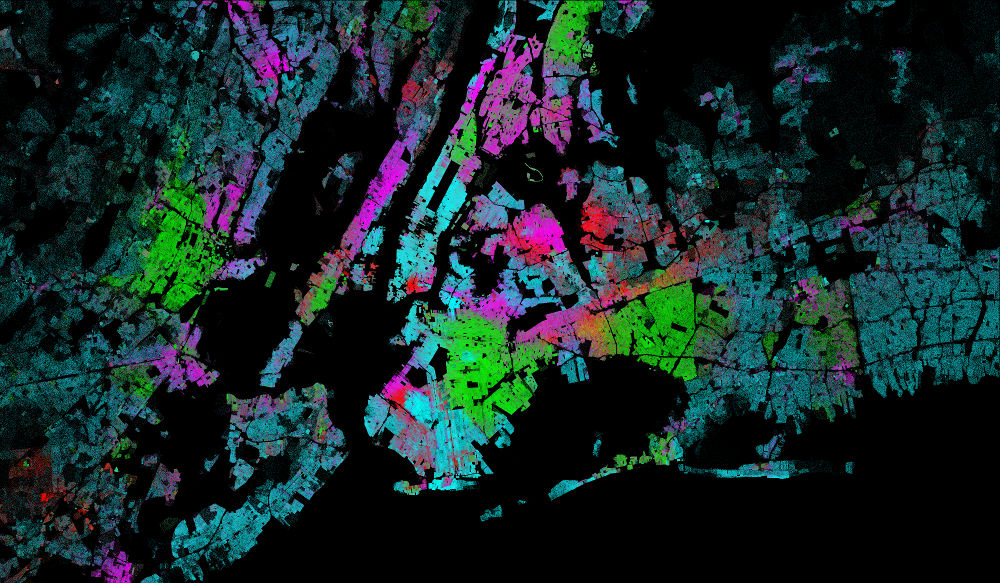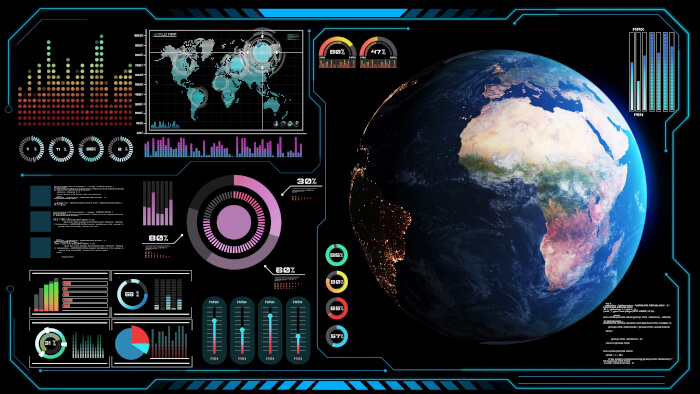Datashader is an open source library for rasterizing large amounts of data into attractive, accurate images. It automates the process of creating meaningful representations of large amounts of data.
Datashader breaks the creation of images into a series of explicit steps that allow computations to be done on intermediate representations. This approach allows accurate and effective visualizations to be produced automatically, and also makes it simple for data scientists to focus on particular data and relationships of interest in a principled way.
Datashader is designed for working with large datasets, for cases where it is essential to faithfully represent the distribution of your data. It generates a fixed-size data structure (regardless of the original number of records) that gets transferred to your local browser for display.
Features include:
- Fast server-side engine designed for dynamic data aggregation.
- Handles interactive visualizations of really large data sets including sets with billions of rows.
- It aggregates data and sends pixels instead of sending data to the client.
- A compute layers that works with Bokeh.
- Provides a flexible series of processing stages that map from raw data into viewable images.
- Projection – each record is projected into zero or more bins of a nominal plotting grid shape, based on a specified glyph.
- Aggregation – reductions are computed for each bin, compressing the potentially large dataset into a much smaller aggregate array.
- Transformation – these aggregates are then further processed, eventually creating an image.
- Supports both Pandas and Dask data frames for Points, Lines, and Graphs, and xarray arrays for Raster data.
- Provides Point, Line, and Raster glyphs, specified at the canvas/scene level.
- Directly supported by HoloViews, with interactive exploration supported for its Bokeh extension, and static plots supported for its Matplotlib extension.
Website: datashader.org
Support: FAQ, User Guide, GitHub Code Repository
Developer: Continuum Analytics, Inc. and contributors
License: BSD License

Datashader is written in Python. Learn Python with our recommended free books and free tutorials.
Return to Python Visualization Packages
| Popular series | |
|---|---|
| The largest compilation of the best free and open source software in the universe. Each article is supplied with a legendary ratings chart helping you to make informed decisions. | |
| Hundreds of in-depth reviews offering our unbiased and expert opinion on software. We offer helpful and impartial information. | |
| The Big List of Active Linux Distros is a large compilation of actively developed Linux distributions. | |
| Replace proprietary software with open source alternatives: Google, Microsoft, Apple, Adobe, IBM, Autodesk, Oracle, Atlassian, Corel, Cisco, Intuit, SAS, Progress, Salesforce, and Citrix | |
| Awesome Free Linux Games Tools showcases a series of tools that making gaming on Linux a more pleasurable experience. This is a new series. | |
| Machine Learning explores practical applications of machine learning and deep learning from a Linux perspective. We've written reviews of more than 40 self-hosted apps. All are free and open source. | |
| New to Linux? Read our Linux for Starters series. We start right at the basics and teach you everything you need to know to get started with Linux. | |
| Alternatives to popular CLI tools showcases essential tools that are modern replacements for core Linux utilities. | |
| Essential Linux system tools focuses on small, indispensable utilities, useful for system administrators as well as regular users. | |
| Linux utilities to maximise your productivity. Small, indispensable tools, useful for anyone running a Linux machine. | |
| Surveys popular streaming services from a Linux perspective: Amazon Music Unlimited, Myuzi, Spotify, Deezer, Tidal. | |
| Saving Money with Linux looks at how you can reduce your energy bills running Linux. | |
| Home computers became commonplace in the 1980s. Emulate home computers including the Commodore 64, Amiga, Atari ST, ZX81, Amstrad CPC, and ZX Spectrum. | |
| Now and Then examines how promising open source software fared over the years. It can be a bumpy ride. | |
| Linux at Home looks at a range of home activities where Linux can play its part, making the most of our time at home, keeping active and engaged. | |
| Linux Candy reveals the lighter side of Linux. Have some fun and escape from the daily drudgery. | |
| Getting Started with Docker helps you master Docker, a set of platform as a service products that delivers software in packages called containers. | |
| Best Free Android Apps. We showcase free Android apps that are definitely worth downloading. There's a strict eligibility criteria for inclusion in this series. | |
| These best free books accelerate your learning of every programming language. Learn a new language today! | |
| These free tutorials offer the perfect tonic to our free programming books series. | |
| Linux Around The World showcases usergroups that are relevant to Linux enthusiasts. Great ways to meet up with fellow enthusiasts. | |
| Stars and Stripes is an occasional series looking at the impact of Linux in the USA. | |
